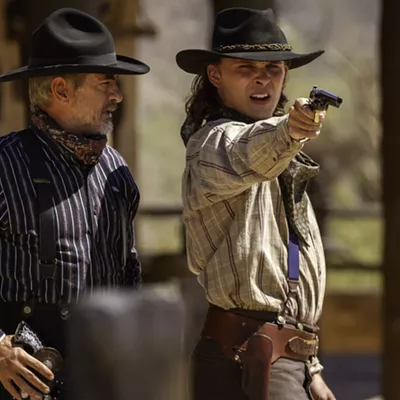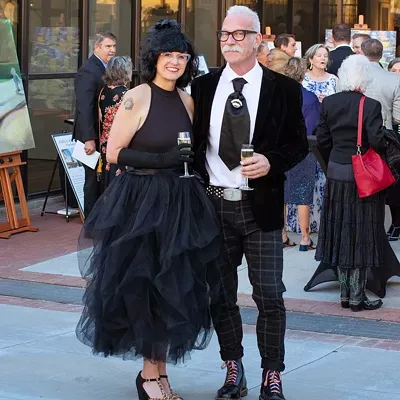To say Arizona Theatre Company's production of August Wilson's Fences is powerful is to understate its depth and breadth. It's a good old-fashioned American play with a linear story told by solidly constructed characters. Its themes and story are rooted in Greek tragedy, and in the same Greek tradition it deals with big issues, particularly that most troubling of all human qualities, hubris. Here it is played out in the lives of those who have unfairly missed out on things that they feel should have been theirs.
It is a grand subject and Wilson doesn't blink as he probes deeply the human experience in the context of African-American lives in the 1950's in Pittsburgh.
Fences is part of the American Century Cycle, in which Wilson visits the black experience in each decade of the 20th century. He was awarded the Pulitzer Prize twice, once for Fences and again for The Piano Lesson. Fences also won a Tony award for Best Play. Wilson collected numerous awards for his impressive body of work, including Britain's Olivier Award as well as seven New York Drama Critics Circle awards.
As are many grand stories, its arc is simple enough. It's the characters that draw our attention, stirring the pot of simmering feelings with their complex personalities until the pot overflows, fueling the flames of destruction, and, perhaps, purification.
Troy (David Alan Andersen) is a 53-year-old illiterate trash collector who played baseball in the Negro Leagues. His family includes his wife Rose (Kim Staunton) and a would-be musician son, Lyons (James T. Alfred), whom Troy fathered with a different woman. His son with Rose, Cory (Edgar Sanchez), is in high school, a good boy and a highly recruitable football player—if Troy would cooperate. Soured by the racial barrier in professional sports, which he is sure has squelched his career, he often clutches a baseball bat, an ever-abiding presence in the front yard along with a rope swinging from a tired tree's limb. At the end of the rope dangles a balled up rag, a sorry stand-in for a baseball for batting practice, but also a handy target for releasing pent up pain and anger.
As Troy, Andersen does an excellent job of wooing us with a character hard to warm up to—a terror that shows flashes of tenderness, but without a hint of sentimentality. It breaks our hearts to watch a man pounded from so many sides that he bottles his feelings until they're forced out. He surely knows they will kill him if he doesn't, and just as surely, he doesn't realize that his actions poison, not only himself, but those he loves. His Friday night bottle of booze nurtures both his good humor and his hatefulness. He struts fearlessly, claiming he has stared Death down time and again while dancing with the devil.
Staunton's Rose is a long-suffering but good-natured wife and mother. She is attached to Troy and loves their son, straining to protect each as their battle plays out. She asks for little and gets less, but demonstrates an awe-inspiring strength when needed. Staunton's performance anchors this story in our hearts.
Troy's quiet friend and co-worker Bono (Marcus Naylor) basks in his friend's passion, but doesn't possess the temperament to challenge the devil. Gabriel (Terry Bellamy) is Troy's brother, a casualty of war with a steel plate in his head. As an innocent dependent on Troy, his brother now considers him another responsibility in an already burdened life. Young Simeeyah Grace Baker is Raynell, a result of Troy's unfaithfulness.
Wilson's tale is full of symbols, and the most easily recognized is, of course, fences. A partially constructed fence bordering the property remains incomplete for most of the play. There are efforts to finish it and arguments about whose responsibility it is to help with its building, leading a character to comment that some people build fences to keep people out, and some build them to keep them in.
It's a powerful metaphor because we encounter and construct fences in just about every realm of our being, seeking what seems to be the safety of separation, of compartmentalization. Boundaries, whether dictated by laws or class or race or by personal choices, are forever being breached. In particular, the boundaries of the territory in which the heart abides are porous. They are especially troublesome.
Another facet of Wilson's tale, and another nod to the Greeks, is the presence of a god and the supernatural. From the get-go we hear about Troy's relationship with a stalking Death, and in the final moments we experience a full-out vision of glory. Director Lou Bellamy, whose fine is often showcased at ATC, assures that this dimension is given a visual presence, and along with lighting designer Don Darnutzer conjures some technical tricks that give goosebumps.
Scenic designer Vicki Smith has created a set that is much more than a visual backdrop for the proceedings. When we enter the theater we are immediately drawn into the world in which these characters are held. The set is a massive, monochromatic smudge on an urban landscape marked by utility poles and power lines, graffiti and grime. The looming set doesn't just bear witness to the play's story; it mocks its pained inhabitants with its massive presence.
There are just a couple of things that get in our way. There's an excessive amount of blocking, particularly for Troy, which seems to have no real purpose and contributes to the play's energy being discharged, interrupting its momentum. The other weakness is the final scene, in which ends are tied up, underscoring the impressive saga we have experienced and granting us the cathartic gift of its telling. Part of this stumble is that Rose's scene with Cory is delivered on the porch of the house upstage, making it hard to understand Wilson's words.
However, these missteps do not detract significantly from the impact of these characters and their story. “Fences” offers riches on many levels, and ATC's thoughtful and penetrating production is not to be missed.







